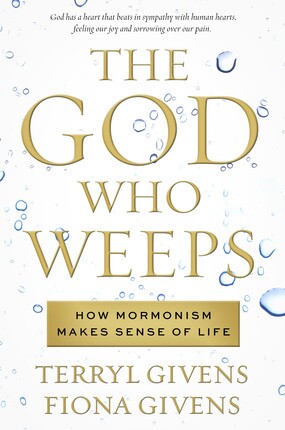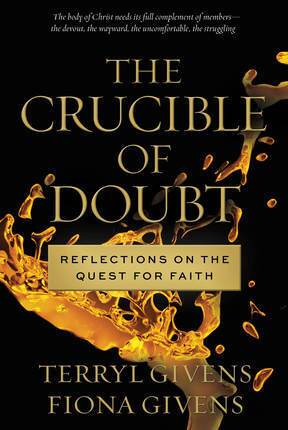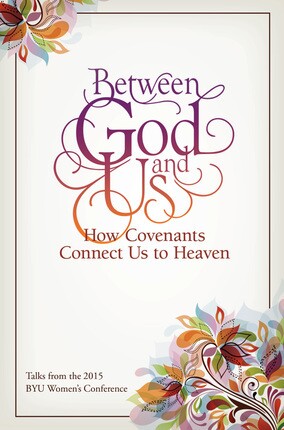In Mark 9:24, the focus in this beautiful scripture is on a distraught father. I’d like to spend a little time with him.
One has the feeling that this father, who has spent years and years seeking a cure for his son, has exhausted every single possible recourse. He’s gone to every healer, to every person he can possibly imagine—including Christ’s disciples—and very possibly expended a great deal of money in search of a remedy for the dreadful malady that has, for years, tortured his son. I also have the feeling that his coming to Christ was the last resort. He had nowhere else to go. He entreats the Savior, “Have compassion on us, and help us” (Mark 9:22). The words are an entreaty from a parent in agony. Every time his son is attacked, his father suffers the brunt of the assault, incapable as he is of protecting his child. Perhaps the question Christ then asks is not so much directed to the child’s father as it is to His apostles, whom He has just reproved for their inability to cast out the malignant spirit—the lack of faith of those who, unlike the father, have witnessed Christ’s power to heal for so long.
He turns to the father, looking deeply into his eyes, touching him no doubt, as was his wont, and suggests, “If thou canst believe, all things are possible” (Mark 9:23). The father wants desperately to believe. Perhaps because, in spite of the pain, he senses in Christ the power to heal that he cries out the words given him by the Savior: “Lord, I believe.” But the lifelong battle with fear, rejection, and disappointment are much more powerful than this fragile, nascent stirring in his heart and mind. Sensing his longing to believe being swamped by the omnipresent terror, he entreats the Lord for aid: “Help thou mine unbelief” (Mark 9:24). He looks back into Christ’s eyes and he knows that Christ has seen that he cannot believe—belief is beyond his power.
The father neither knows nor is capable of believing that the Man standing before him is the promised Messiah. And what is Christ’s response to the desperate plea of the man who lacks both knowledge and belief? He heals his son. He heals his son. And in so doing, the Savior of the World answers the father’s desperate prayer, “Help thou mine unbelief.” Why? We have already ascertained that the father is not able to believe. Could it be that the Savior heals simply out of compassion for the father and the son? Looking into the desperate eyes of this father, did not the Lord also feel the desperation that he felt? Was He not moved by love for this man and his anguish? And Jesus, after casting out the malevolent spirit, took the child “by the hand, and lifted him up; and he arose” (Mark 9:27).
The Lectures on Faith state that “in order that any rational and intelligent being may exercise faith in God unto life and salvation [we need to know not only] that He exists [but also to have] a correct idea of his character, perfections, and attributes.” Such an interesting idea. Joseph doesn’t simply say that we need to know God’s character. He inserts the word correct, which, of course, implies that there are incorrect characteristics attributed to God in the canon. If people wish to learn about the God of Christianity, it is more than likely that they will be directed to the Bible. However, the Book of Mormon states that during the process of Biblical redaction “many parts which are plain and precious” have been removed (1 Nephi 13:26; emphasis added).
To my mind the most plain and precious thing that has been removed from the biblical text is the compassionate God whom Christ emulates in this story. True, the God of compassion is to be seen in the Old Testament—but you have to search for Him. The God of wrath, vengeance, and destruction dominates the Biblical narrative.
In the nineteenth century, this god ruled supreme in this country, and that same god ruled pretty much over most of Christianity and beyond. When God first appears to Joseph in the Sacred Grove, the Lord says, “their creeds are an abomination before me” (Joseph Smith–History 1:19). To which creeds is God referring?
Due to the prevalent anti-Catholic sentiment of much of our Mormon past, we have long assumed that the Catholic creeds were the “abomination” to which the Lord is referring. However, upon closer examination, it is more likely to be the Westminster Confessions and the Thirty-Nine Articles of the Church of England—the Protestant creeds—for it is they that declare that God is a God without body, without parts, and, most importantly, without passions. (It was to those creeds that Joseph afterward frequently referred; it is unlikely he would even have known the Catholic creeds.) In other words, God could not be moved by human suffering. He lacked compassion. As the Protestant creeds are based on an understanding of God’s character and attributes found in the Bible, it is to the Restoration texts we must look for scriptures that restore the “plain and precious thing”—God’s compassion.
Jacob 5, for example, is one of the longest chapters in the Book of Mormon. It comprises 77 verses—all of which could be summarized in three. What is repeated again and again is the length to which God is willing to go to save each of his olive trees. The leitmotif that flows throughout is “it grieveth me.” “It grieveth me that I should lose [this tree]” (see vv. 7, 11, 13, 32, 46, 47, 51, and 66).
So concerned is he for every single one of the trees in the olive grove that he goes to the nethermost parts of the grove, to the hopeless, the helpless, the corrupted and the lonely, the despairing, the marginalized, those who have lost loved ones, their belief, the ability to hang on in the face of so much darkness. The lesson of Jacob 5 is this: In choosing to set His heart upon us—to love us—God deliberately makes Himself vulnerable to our pain.
Perhaps the most dramatic rendition of the cost of Heavenly love is to be found in Moses 7. After ascending to Heaven with his city, Zion, the prophet Enoch is more than a little discomfited. Instead of the joyful reception he had, no doubt, anticipated, Enoch notices, perhaps with some chagrin, that God’s emotional energy and focus remain earthbound. Man of Holiness—God the Father—is weeping tears of grief. So unanticipated is this display of suffering that Enoch asks God, not once but three times: “How is it that thou canst weep, seeing thou art holy, and from all eternity to all eternity?” (Moses 7:28, 29, 31). And God answers, “Wherefore should not the heavens weep, seeing these [my other children] shall [continue to] suffer?” (Moses 7:37).
We worship a God who chose to set his heart upon us. And in so doing, became vulnerable to our suffering. And herein lies his power to draw us all, His suffering children, home to the eternal embrace of our Heavenly Parents. As the brilliant and courageous theologian Dietrich Bonhoeffer stated, “Only the suffering God. . . . wins power and space in the world.” This is the “plain and precious thing” that was lost. This is the God whom Christ was emulating in his encounter with the desperate, suffering father and his malady-ridden child.
I am sure many, if not all of us, have loved ones who are suffering from a variety of causes. We may be attempting to carry their burdens as well as our own. Some of our children have drifted away from the Church disenchanted by the discovery of an unfamiliar history or theology. Some struggle with depression or any number of ailments, as did one of my sons.
For a variety of reasons, he slipped onto a path injurious to himself and to his family. And yet, and yet . . . God was aware of my son and was working with him all the while. I was only aware of my failings as a mother, recalling, ad nauseam, the family home evenings that were missed or the family scripture study skipped, heaping recrimination upon my own head until, exhausted, I found myself on the road to the temple. On my return home, I felt that I was asked a number of questions, the last of which was, “Have you loved the children I sent you with all your heart?” Without the slightest hesitation, I could answer the question in a resounding affirmative—my failures notwithstanding. I have loved my children with all my heart. I was then reminded that this was all I that was required to do, and that the Lord would continue the journey with my son, who is also His son. But I was given some homework to do. I was asked to visit the temple more frequently and to fast often on behalf of my child. And the months passed—many of them.
Until one evening when the house was still and quiet and devoid of all its regular inhabitants and visitors—I was prompted to call my son. When he picked up, I immediately heard the catch in his voice, signaling that something was seriously amiss. Among other things, he told me that he saw nothing beautiful anymore, either in the world or in himself. Alarmed, I opened my mouth and spoke. And spoke, and spoke, and spoke; I have no idea what I spoke. Words just poured out. It was months later that my child returned home. Weeks passed, and one evening, as we were sitting on the veranda chatting, he asked, “Do you remember the night you called me?” I remembered it very clearly. He continued, “I don’t remember what you said, but you spoke beautiful things to me.” In time—in time the Lord leads each of His children home. Our scriptures attest that not only does Our Father expend considerable effort to ensure that we can return Home, but that He will never give up until we are all, once again, Home.
This is the glorious plan of the gospel of Jesus Christ. The Good News is that our Heavenly Parents have created a plan of happiness and salvation, whereby the entire human family can return home to Them. Doctrine and Covenants 121 expands our understanding of God’s divine attributes and character: God is gentle, kind, longsuffering, infinitely patient, filled with love unfeigned—love unconditional—love without end (see D&C 121:41–42). Time is no barrier to our God; time is no barrier. He has all time to rescue each one of us, on our own schedule— no matter the gravity of our ailment.
In all of our pain and suffering, it is helpful to recognize that we are not alone and that there are those around us who need us, that the person sitting next to you is suffering, and if we are able to develop that compassion, we become participators with Christ in the great healing process of mankind. We become co-participants with Christ, “Saviors on Mount Zion.”
We are so fortunate to be members of this church, to be participants in the gospel of Jesus Christ. May I leave you with my favorite quote from the book of Romans: “For I am persuaded, that neither death, nor life, nor angels, nor principalities, nor powers, nor things present, nor things to come, nor height, nor depth, nor any other creature, shall be able to separate us from the love of God, which is in Christ Jesus our Lord” (Romans 8:39).
Find more powerful insights from several more well-known Latter-day Saints in Between God and Us: How Covenants Connect Us to Heaven. Available at Deseret Book stores and deseretbook.com.
Read more by Fiona Givens in The God Who Weeps: How Mormonism Makes Sense of Life and The Crucible of Doubt: Reflections on the Quest for Faith, both of which she co-authored with her husband, Terryl Givens. You can also hear more from Fiona at TOFW: Time Out for Women events in Tucson, Arizona, and Cincinnati, Ohio, this April!





